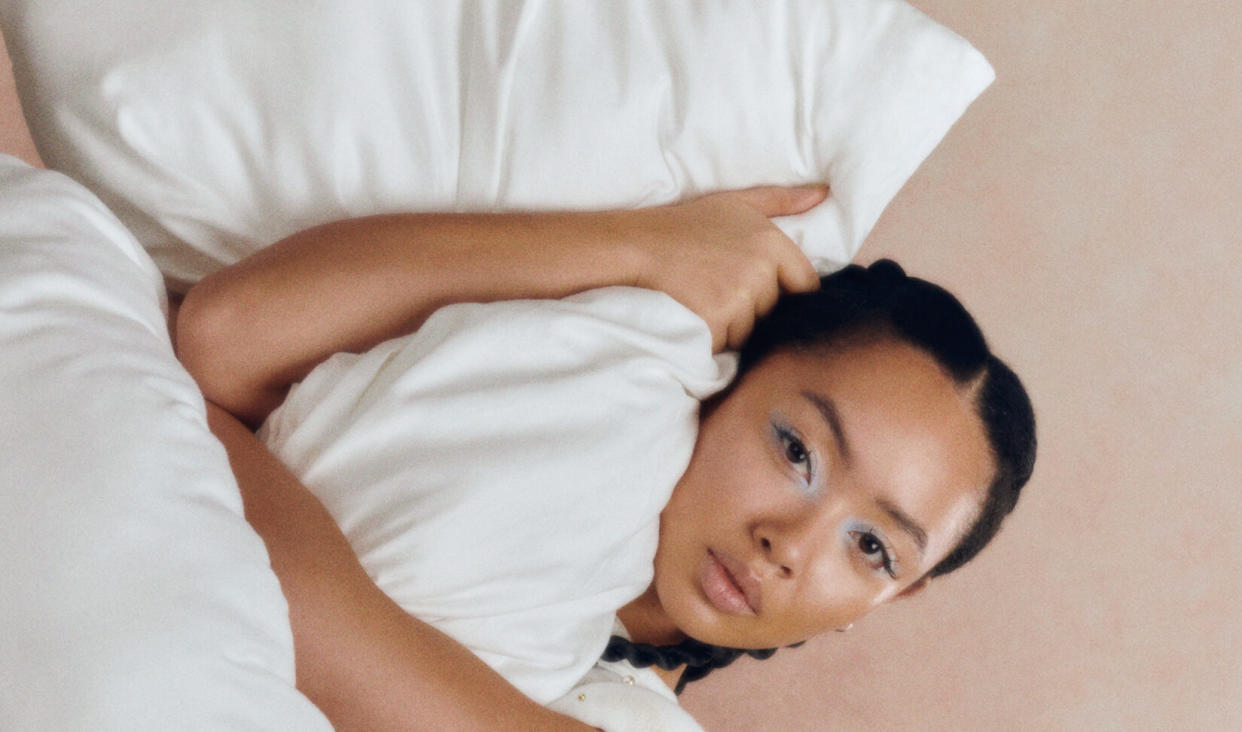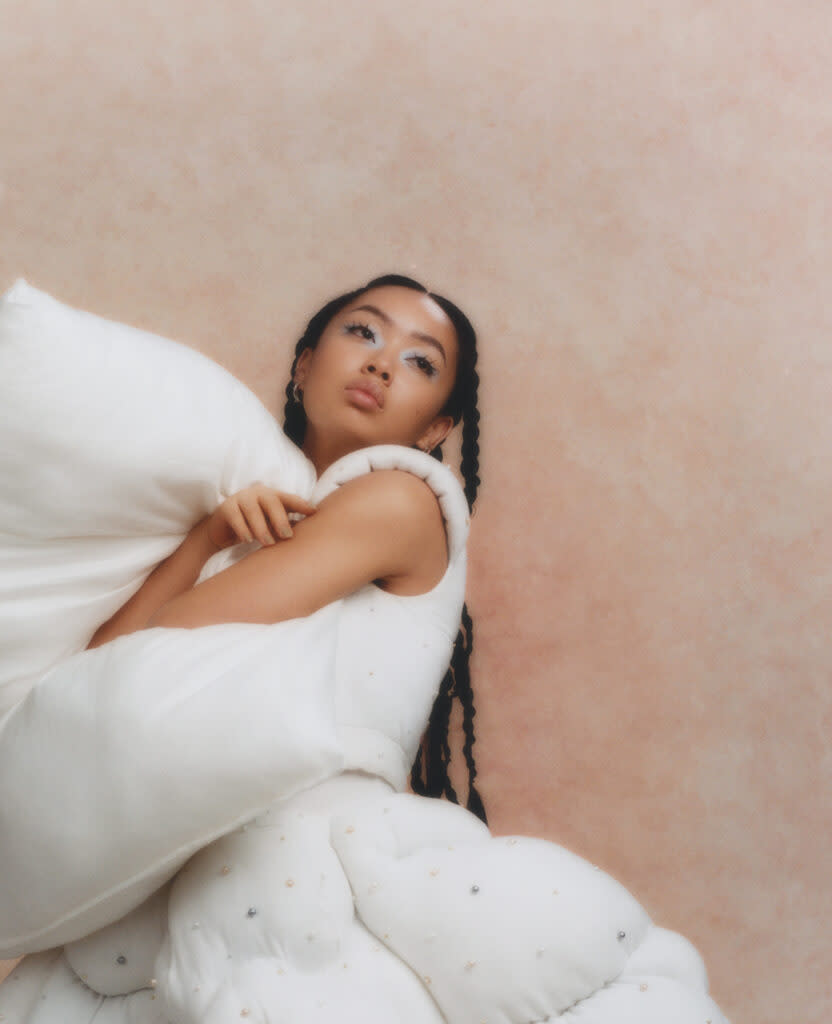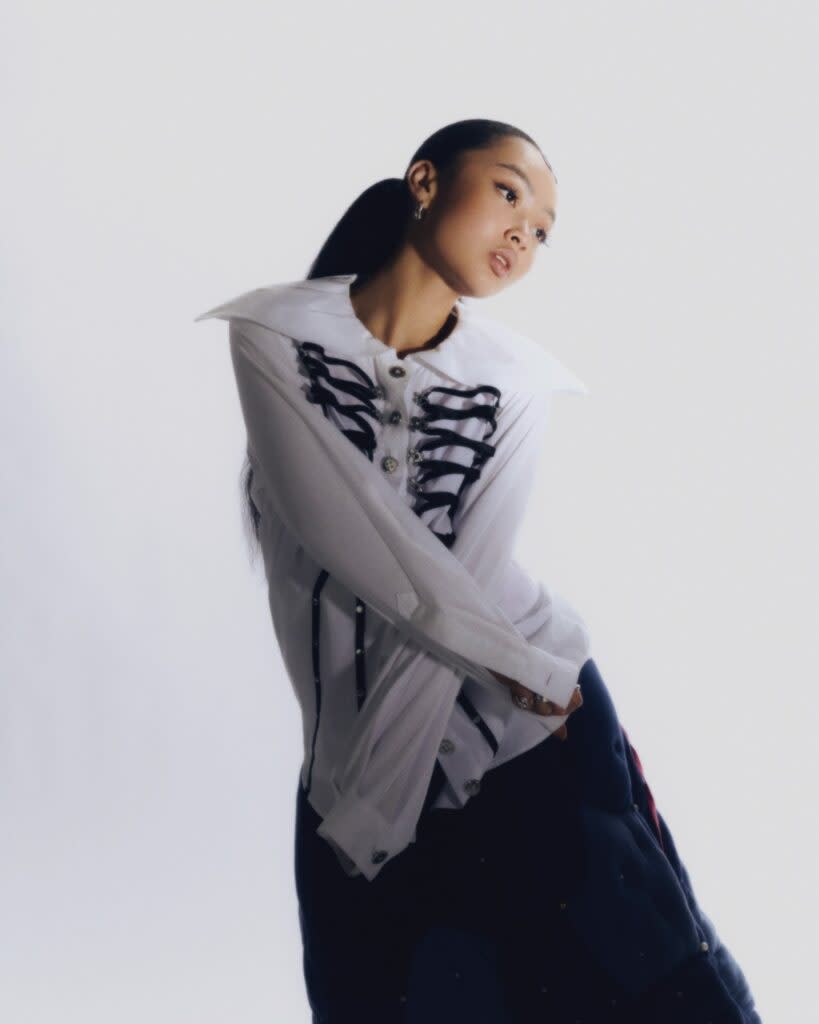Griff: Spinning Around

When Griff entered the global pandemic with the rest of us, she was an up-and-coming talent with one debut EP under her belt. As it ended two years later, she had added hit single ‘Black Hole’ and headed out on an arena tour with Dua Lipa, before going straight into stadiums with Ed Sheeran and Coldplay. It’s reasonable, then, that the first feeling that came to her when thinking about her debut album also ended up being its title and first single: vertigo.
“I was never expecting the kind of commercial success that ‘Black Hole’ got,” Griff explains now, speaking from Los Angeles on a writing trip. “Between that and coming straight out of the pandemic into touring for the first time, my brain was completely frazzled.” Though reflecting on a fraught and intense period, she is both open and warm, speaking from a more balanced place.
In between dates on the stadium tours, she decided to escape to Airbnbs around the country to put these feelings into songs that dissected the whirlwind she was in and brought a little calm among the chaos. Her first stop was musician Imogen Heap’s house, a roundhouse just out of London that has become a home for many musicians. Its spiral staircase struck a chord with Griff — the symbol has become inextricably tied to the album and even extends to the artwork, with Griff’s hair forming a long spiral — as she wrote ‘Vertigo’, a song about coming to terms with uncertainty.
“It was a real tension break for me,” she reflects of writing the song. “I felt like there was a world to be explored from there.”
Born Sarah Faith Griffiths, the now-23-year-old began making and producing music in her Kings Langley bedroom in Hertfordshire as a teenager. Seeing herself as more of a songwriter and producer than pop star, her earliest work was imbued with a fiercely DIY ethic even as she signed a deal with Warner Records. The music is full of pop signifiers, but always strays down stranger and less linear paths. There is plenty of Taylor Swift to be heard in the music — Swift is a champion of Griff and invited her to perform on The Eras Tour at Wembley Stadium last month — but her songwriting feels more akin to Lorde or Robyn, with a prioritisation of truth over tidiness.
Making debut mixtape One Foot in Front of the Other almost entirely alone at home in lockdown, Griff also showed her producer chops in YouTube series Against the Clock, where she would invite a collaborator to arrange and record a cover within an hour. It was clear from the get-go that Griff’s work is more about the craft than the presentation, which gave her a crossroads moment when she found herself playing stadiums and performing at the BRIT Awards, where she won Rising Star in 2021.
“Obviously, I dream about those moments and playing my songs to the biggest crowds possible, but I get so nervous and so stressed,” she says. “The more I’ve been in those environments, the more I realise that I really like writing songs and being in the studio. Whatever helps me carry on being able to write songs, I’ll do it.”
Griff’s lyrical content also sets her apart from the shiny, uncomplicated pop stars that make it to radio and stadiums — there are few neat narrative bows or pure happy endings in the tracks on vertigo and beyond. “You’re scared of love, well aren’t we all?” goes the kiss-off of the album’s title track, while One Foot in Front of the Other standout ‘Earl Grey Tea’ sees her sing: “You’re so scared of dying slowly / But why aren’t you more scared of dying lonely?”

“The real, raw emotion of pain is rarely shiny and with a bow on it,” says Griff. “Maybe because of that I struggle to write super polished pop music because it’s not where I see my emotions resonating. I grew up loving Sia and Julia Michaels and their style of writing was so much more emotion-first than, ‘Here’s the home-run line and here’s the catchy chorus.’ Emotions are messy and raw.”
vertigo has been released in three parts, with volumes one and two arriving over a nine-month period before the full album’s release. While it wasn’t written entirely chronologically, Griff says the first portion of the album represents the whirlwind of chaos that she was feeling. On ‘Into the Walls’, she sings of manic emotions and hoping to disappear from the spotlight (“Yesterday I felt like dancing, tomorrow maybe I’ll cry / Today, I feel like watching, so let them walk on by”) while ‘Astronaut’ — arranged with help from Chris Martin during the Coldplay tour — is a soft piano ballad but with a savage lyrical punch: “You said that you needed space? Go on then, astronaut.”
Volume two was then led by ‘Miss Me Too’, the album’s closest thing to a pop smash. On it, Griff mourns old versions of herself that leave along with the closing of a relationship, again showing her prowess at finding new and unique ways of telling heartbreak stories within pop frameworks. “At the start, there was a moody, dark, heartbroken feeling that I was really gravitating towards, and it was later on that I started leaning towards the more euphoric sounds.”
She says of the album’s emotional centrepiece: “I was reflecting on the idea of following the plan and feeling like everything was going right, but actually everything crumbled. That shakes off a version of you. We’ve all had that, whether it’s coming out of Covid or growing up. I look back at an older version of myself and think, ‘I had way more trust in the world and in people then.’ Maybe I wrote that song from more of a hollow place than I realised.”
After dredging up her emotions for the heavy and melancholic first volume of the album, Griff wrote ‘Miss Me Too’ during a trip to Sweden. “I felt a lot lighter and ready to write something more euphoric,” she reflects now, with the second volume of the album also housing the playful ‘Hole in My Pocket’ and dance-adjacent ‘Cycles’.

“I was a little less emotionally stressed about the music,” she adds. “Because I think of myself as a songwriter first, so much of my confidence and self-worth is based on whether I think I’ve written good songs or not, and I found this whole process really emotionally wrestling to believe in.”
The remaining songs on the album — loosely considered volume three — contain less of a tidy narrative arc but fill in the gaps. They include the outstanding ‘Tears for Fun’, which packs a huge punch through stacks of triumphant vocals, while ‘Hiding Alone’ is a funkier, breezier pop song, and ‘So Fast’ strips things back and shows Griff’s prowess as a singer-songwriter.
While a lot of the narrative around Griff’s emergence was tied to her self-production, vertigo sees her slowly and carefully expand her core of collaborators. She once again worked closely with Congee — aka Sam Tsang — as a co-writer, with producers including LOSTBOY and Mura Masa. “It was a very slow process, and who I let in was very minimal,” she says of expanding her circle while maintaining ultimate creative control and keeping her signature production stamp on the album. “I had to keep it tight because I struggle to write with strangers.
“It’s such a weird formula the way the music industry decides you should write songs,” continues Griff of the recording process. “‘Hey, go into a session, meet a stranger and pour your heart out!’ I’ve really struggled with that concept and could only write with my really good friends. It was also about the nature of the writing. I would book these Airbnbs and just send my location to those three of my mates, saying, ‘Come find me if you’re free!’”
Instead, Griff removed herself from these traditional frameworks and found any Airbnb that would house her in order to empty her frazzled brain into an album that establishes her as a fantastic new pop star, songwriter and producer.

“I didn’t even want to be in a studio,” she reflects. “I didn’t want to think about being in a place that was costing people money and at the end of it a label would say, ‘So, have you written some hits?’ It was me protesting against all of the expectations that were put on me. I just wanted to disappear and figure it out and find a little bit of myself by removing myself from the noise. I wanted to get into the good part of my head and out of the bad part.”
The album was written — Griff estimates — in eight different houses during these rare moments of quiet between gigs in front of 80,000 screaming fans. “Every time, it was hard,” she remembers of the changes of pace that birthed vertigo. “Touring is pretty brutal, especially when you’re quite early on in it. That first year coming out of Covid, it was an experience that no one had really prepared me for. When I would sit in silence and try and write songs, I would always feel quite low and empty.
“That’s why writing songs feels quite miraculous,” she adds with a smile. “You feel like you’ve got nothing and then in a couple of hours you’ve written ‘Vertigo’ and go, ‘Oh, cool!’ That’s the addictive part that I love.”
From a period of whiplash-like change, vertigo stands as a testament to Griff’s power as a songwriter and a producer, as well as a document of moving through pain and transformation. It sees her continue to tread the line between cult star and mainstream pop star with a constant commitment to honesty and authenticity.
“I went for dinner with LOSTBOY last night and we were talking about what we’re going to do next,” she says, looking to the future with a new lightness, having exorcised her growing pains on her debut album. “I realised I want to move quicker now. I want to follow my gut. I’m really excited for whatever happens next, because I’m going into it as a more self-assured version of myself.”
Taken from the next issue of Rolling Stone UK. You can buy it here.

 Yahoo News
Yahoo News 
